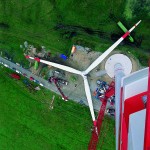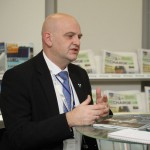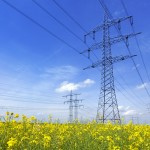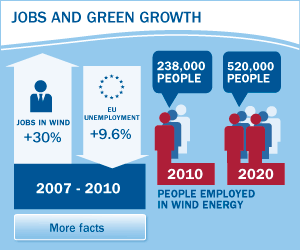 It may look like one machine, but the average wind turbine is made up of 9,000 different components. Each of these needs to be manufactured, transported and put together, and a blip or delay at any one stage can affect the whole process.
It may look like one machine, but the average wind turbine is made up of 9,000 different components. Each of these needs to be manufactured, transported and put together, and a blip or delay at any one stage can affect the whole process.
The supply chain is crucial to the wind energy industry, with 75% of the total cost of energy for a wind turbine is related to upfront expenses such as the cost of the turbine, foundation, electrical equipment and grid connection.
Many of the materials used in wind turbines – such as stainless steel, aluminum, glass and carbon fibres — are also required in other industries, making a smoothly operating wind power supply chain all that more important. continue reading »
 The Greek government is convinced that investing in renewable energies is the most efficient way to reshape the country’s beleaguered economy, Greek Energy Minister Tina Birbili told Wind Directions magazine recently.
The Greek government is convinced that investing in renewable energies is the most efficient way to reshape the country’s beleaguered economy, Greek Energy Minister Tina Birbili told Wind Directions magazine recently.
A few months ago, the government raised the 2020 renewables target to 20% – higher than the 18% goal set in the EU Renewable Energy Directive. Birbili explains that this is because “boosting green development” is seen as the best way for Greece to achieve its “energy, environmental and economic growth targets”.
The new legislative framework, passed in June this year will help, she says. It should speed up permitting processes, remove barriers to grid connections and kick off the development of offshore wind energy. The next step is to extend and reinforce the grid, and improve connections to other countries. continue reading »
 One of the biggest grids-related buzzes in the last couple of years has been the coming together of ten countries to promote an interconnected power network in the northern European seas. At the GRIDS 2010 event in Berlin I caught up with Jan Hensmans from Belgium’s Economy Ministry, who explained the ‘North Seas Countries Offshore Grid Initiative’ (NSCOGI) in more detail.
One of the biggest grids-related buzzes in the last couple of years has been the coming together of ten countries to promote an interconnected power network in the northern European seas. At the GRIDS 2010 event in Berlin I caught up with Jan Hensmans from Belgium’s Economy Ministry, who explained the ‘North Seas Countries Offshore Grid Initiative’ (NSCOGI) in more detail.
Why did Belgium decide to get involved in NSCOGI?
We saw the huge energy potential of the north seas and we had been involved in the ‘pentalateral energy forum’ with Germany, France, the Netherlands and Luxembourg, but five countries were not enough! So we set up a meeting with those and additional countries and the ministers signed a political statement on 7 December 2009. Then we organised a high level meeting in Ostend with EWEA – at which we agreed to sign a memorandum of understanding, which we will do on 3 December in Brussels. continue reading »

Imagine not being able to buy food or clothing from any country apart from your own. How boring – and expensive – our lives would be. Yet this is the case with most of our electricity. Because our power grids have few links between countries, 95% of power in Europe is consumed in the country in which it is produced.
An updated, Europe-wide power grid, with stronger, more numerous interconnectors, would allow wind power to be transported from wherever in Europe it’s blowing to wherever in Europe the consumers are, and open up cross-border trade in electricity.
Opening up the power market in Europe would have a far greater impact on thousands of consumers, bringing prices down as fuel-free wind power and other renewables would be preferred by the market to fossil fuels with unpredictable costs. continue reading »
 In an impressively unique attempt to promote the global need for the creation of green jobs, world leaders attending last week’s G20 summit in Seoul were each asked to set aside one hour in the next few months to learn how their countries can benefit by economic solutions to complex 21st century problems.
In an impressively unique attempt to promote the global need for the creation of green jobs, world leaders attending last week’s G20 summit in Seoul were each asked to set aside one hour in the next few months to learn how their countries can benefit by economic solutions to complex 21st century problems.
“Creating green jobs on a massive scale is a two-way street,” Ditlev Engel, President and CEO of Vestas Wind Systems A/S, said in a press release announcing the plan put forth at the G20 Business Summit, a largely unreported side session to the main meeting, by a working group for creating green jobs.
“Give us the policy frameworks, and we’ll give you the results. We’ll make the investments, we’ll take the risks, and we’ll create the jobs. But this requires a policy framework that re-balances the incentives indisputably in favour of green investment.” continue reading »
 It may look like one machine, but the average wind turbine is made up of 9,000 different components. Each of these needs to be manufactured, transported and put together, and a blip or delay at any one stage can affect the whole process.
It may look like one machine, but the average wind turbine is made up of 9,000 different components. Each of these needs to be manufactured, transported and put together, and a blip or delay at any one stage can affect the whole process.









